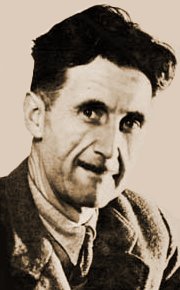 George
Orwell
George
Orwell |
About
the Author
George
Orwell was born Eric Arthur Blair. The son of a civil servant,
he was born in India in 1903. His family having moved to
England in 1907, he commenced studies at Eton in 1917, where
he contributed to several college magazines.
Orwell
served with the Indian Imperial Police in Burma from 1922
to 1927. Years of poverty followed.
|
|
In
1936 he fought for the Republicans in the Spanish civil
war, and was wounded. He was admitted to a sanitorium in
1938. During World War II, Orwell served in the British
Home Guard, and subsequently (from 1941 to 1943) worked
for the BBC Eastern Service. He was the literary editor
of the Tribune, and contributed to the Observer and the
Manchester Evening News.
George
Orwell is most famous for his books Animal Farm (published
in 1945) and 1984 (published in 1949). He died in London,
England in January of 1950.
About
the Book
Owing
largely to progress in communications and other technologies,
governments and businesses today have more power than ever
to monitor and influence what we buy, were we go, what we
watch or read, and what we believe. Recent terrorists attacks
in the United States of America (most notably, the destruction
of the twin World Trade Towers in New York and the Pentagon,
and the delivery of Anthrax spores to public officials and
the media in the U.S.A.) has most citizens more willing
than ever to give up more individual freedom and privacy
in exchange for the promise of greater security. Long denied
the right to violate basic individual rights and freedoms
and privacy, the world's law enforcement and surveillance
communities and their governments are seizing the day, and
making rapid steps to pass relatively permanent legislation
giving the government powers which - prior to the acts of
September 11, 2001 - would have been considered by the general
populace to be powers properly unleashed only for temporary
periods of national emergency.
In
the process, questions are being raised as to whether the
surrender of individual freedom will actually result in
greater security, or whether we, in giving up freedom for
security, are satisfying the aim of the terrorists to begin
with: to undermine individual freedom of choice, equality
under the law, and the dignity of every individual.
1984
has long been the first book to which we have turned for
a vivid picture of a government that has used war to justify
infringement on freedom; that has used speech codes to limit
everyone's ability to understand higher concepts or concepts
that favour human individuality; that uses powerful media
to build unwarranted consensus and rewrite history; and
that has used technology to nip political opposition and
individualistic or eccentric practices in the bud. Far from
being a caricature, it insightfully and skillfully characterizes
the tendencies and motivations of unlimited government power,
and the horrifying, hopeless result of such government:
humanity denied its freedom to think, to be rational, and
to dissent...its freedom to be human.
If,
after finishing 1984, you find yourself nervous and paranoid,
then: good. You have just taken a step closer to respecting
the importance of human freedom and dignity, and the dangers
in allowing governments to usurp your freedom to dissent
or be different. All that remains is to fight to maintain
or regain your ownlife (read the book, you'll know
what we mean).
 .. ..
|